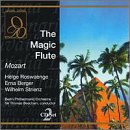| All Artists: Wolfgang Amadeus Mozart, Thomas Beecham, Berlin Philharmonic Orchestra, Carla Spletter, Elfriede Marherr, Erna Berger, Ernst Fabbry, Gerhard Hüsch, Heinrich Tessmer, Helge Rosvaenge, Hilde Scheppan, Irma Beilke, Ruth Berglund, Tiana Lemnitz, Walter Grossmann, Wilhelm Strienz Title: Mozart: The Magic Flute Members Wishing: 0 Total Copies: 0 Label: Opera D'oro Release Date: 11/16/1999 Genre: Classical Styles: Opera & Classical Vocal, Historical Periods, Classical (c.1770-1830), Modern, 20th, & 21st Century Number of Discs: 2 SwapaCD Credits: 2 UPC: 723723670328 |
Search - Wolfgang Amadeus Mozart, Thomas Beecham, Berlin Philharmonic Orchestra :: Mozart: The Magic Flute
 | Wolfgang Amadeus Mozart, Thomas Beecham, Berlin Philharmonic Orchestra Mozart: The Magic Flute Genre: Classical
|
Larger Image |
CD Details |
CD ReviewsMagic Flute-Complete Opera L. E. Cantrell | 09/15/2000 (2 out of 5 stars) "This is a 1933 recording of the most beautiful opera Mozart ever composed. I found the static on the cd distracting, and I was more than alittle upset over the lack of a libretto. I have heard other recordings that do the opera justice, and let one feel the music. I would not buy this again." Famous and historic recording L. E. Cantrell | Vancouver, British Columbia Canada | 01/17/2006 (5 out of 5 stars) "This set is the very definition of the phrase, "famous recording." It was recorded in Berlin in 1937-38 and has not been out of print since then. Amazon, I see, currently carries it in four or five competing versions. Of them, I suspect that the most satisfactory sound is to be found on the Naxos re-issue, but that version appears to be on the verge of dropping out of the catalogue.
For many years, this was the only available near-complete recording of "Die Zauberfloete," and it is still the definitive recorded version in the minds of many older fans. Because it was issued on 78-rpm records that played for a bit over three minutes apiece, the complete opera would have required about forty sides, or more than twenty records, all to be sold in bound albums of five records each. Just lifting such a thing would be an effort, let alone paying for it.* As a strictly practical and commercial decision, Walter Legge, the producer, decided to forgo recording the spoken dialogue. The cast was a very strong one for the time--and for ours, too--but it was not entirely the cast that Beecham and Legge had originally planned. Since the Berlin Philharmonic was one of the chief selling points of the production, the opera had to be recorded in Berlin. Some of the originally chosen performers chose not to risk themselves within the grasp of the Third Reich. More than that, despite the fact that the "Zauberfloete" recording was an English initiative, produced by an English company, with an English conductor, it was regarded as so much a showpiece of German Kultur that the Reich Propaganda Minister was determined that it be performed by singers whom he regarded as possessing sufficiently Aryan background. Leaving politics behind, this is a great performance. Beecham's overall concept remains as brilliant today as it was almost seventy years ago. The singers are as good as any today, although they reflect a different performing style from our present one. Helge Rosvaenge, for instance, had a much heavier voice than the typical Tamino of today, and he was associated with operatic roles that our current Taminos could never touch. Erna Berger, The Queen of the Night, sounds like nobody singing today--trust me on that! She is stupendous, nevertheless. I am assigning five stars to this "Magic Flute" for its artistic value and its historic interest. While I cannot recommend this set to anyone as a first or only recording of Mozart's operatic masterwork, I enthusiastically urge it on anyone who desires a second or back-up set. __________________ * Believe it or not, Karajan's first recording of the "Die Meistersinger" was issued in 78-rpm format--68 sides on 34 records." |

 Track Listings (9) - Disc #1
Track Listings (9) - Disc #1